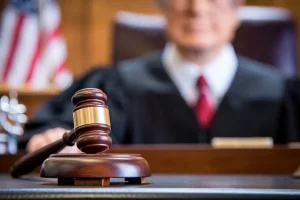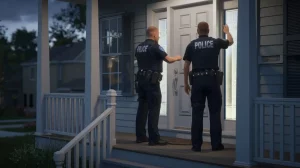If you’re facing allegations of domestic violence in Wake County, North Carolina, navigating the legal system can be a daunting  and complex process. While criminal charges may be looming, there also may be a related Domestic Violence Protective Order (DVPO) under North Carolina General Statute 50B.
and complex process. While criminal charges may be looming, there also may be a related Domestic Violence Protective Order (DVPO) under North Carolina General Statute 50B.
We hope to demystify the DVPO hearing process. If you have questions, give John Fanney in Raleigh a call at 919-617-7009.
The Purpose and Nature of a Domestic Violence Protective Order Hearing
A DVPO hearing in Wake County serves to determine whether acts of domestic violence have occurred and if protective measures are necessary. These hearings are civil proceedings, distinct from any criminal charges that may be pending. The Court (the Judge assigned to hear the case) considers the safety and well-being of the alleged victim and any minor children involved.
Domestic Violence Criminal Charges in Wake County
During the hearing, both parties have the opportunity to present their case. The judge will consider evidence and testimony to decide whether to grant a protective order, often known as a DVPO or “50B Order.” It’s important to note that the standard of proof in civil cases is lower than in criminal proceedings, requiring only a “preponderance of the evidence” rather than proof “beyond a reasonable doubt.”
The scope of these hearings can be broad, covering various aspects of the relationship between the parties. The Court may delve into the history of the relationship, incidents of violence or threats, and the current living situation of both parties. This comprehensive approach allows the judge to make an informed decision about the necessity and scope of any protective measures.
Preparing for Your DVPO Hearing: Documentation and Evidence
Proper preparation is key for anyone facing a DVPO hearing. This includes gathering any relevant documentation that might support your case. Such evidence may include:
- Text messages, emails, or social media communications
- Phone records
- Witness statements
- Photographs
- Medical records (if applicable)
- Police reports (if any)
- Financial records (if relevant to support claims or defenses)
- Employment records (if time off work is related to the case)
It’s a good idea to organize these materials chronologically and make copies for your lawyer. Remember, the judge will be looking at the totality of the circumstances, so providing context for any incidents or interactions can be helpful. If nothing else, it helps your defense lawyer understand the nature and circumstances of what led up to allegations of domestic violence.
What you need to know about Restraining Orders
When preparing documentation, it’s important to be thorough and honest. Attempting to hide or manipulate evidence can severely damage your credibility in court. Let your lawyer worry about the admissibility of evidence and how to present your narrative to the Court. If there are aspects of the evidence that may seem unfavorable, it’s better to address them upfront with a clear explanation rather than trying to conceal them.
Lawyers don’t like surprises. There’s nothing worse than having your legs taken out from underneath you in court – John Fanney, Wake County Domestic Violence Lawyer
Additionally, preparing a timeline of events can be extremely helpful, both for personal reference during the hearing and potentially as a document to submit to the Court. This timeline should include dates of significant events, communications, and any incidents relevant to the case.
The Domestic Violence Protection Order Hearing Process: Step-by-Step
On the day of the hearing, arrive at the Wake County courthouse early. It’s located at 316 Fayetteville St. Mall in Raleigh, North Carolina. The process typically unfolds as follows:
- Check-in with the clerk and/or “answer up” at the Calendar Call. Wait for your case to be called. This can often involve a significant waiting period, so be prepared to spend several hours at the courthouse. Take that into consideration when parking!
- Once called, both parties will go before the judge. If either party has an attorney, the attorney will speak on their behalf.
- The plaintiff (the person seeking the DVPO) will present their case first, potentially calling witnesses. This may include their own testimony about alleged incidents of domestic violence, as well as any supporting evidence they’ve gathered.
- The defendant (the person accused) will then have an opportunity to respond and present their own evidence and witnesses. This is the chance to provide your side of the story, challenge any inaccuracies in the plaintiff’s testimony, and present any evidence that supports your position. It’s important to understand the possible implications of testifying at a DVPO hearing on any pending criminal charges.
- The judge may ask questions of either party or their witnesses. These questions can be direct and probing, so it’s important to answer honestly and clearly.
- After hearing all evidence, the judge will make a decision. This decision may be immediate, or the judge might take the matter under advisement and issue a ruling later.
Throughout this process, it’s essential to remain calm and respectful, regardless of the emotions involved. The courtroom is a formal setting, and your behavior can significantly impact the judge’s perception.
Potential Outcomes and Types of Relief Granted Under N.C.G.S. Chapter 50B
If the judge finds that acts of domestic violence have occurred, they may grant a protective order. This order can include various forms of relief, such as:
- Requiring the defendant to stay away from the plaintiff’s home, work, or school
- Awarding temporary custody of minor children
- Establishing temporary visitation rights
- Ordering the defendant to surrender firearms
- Requiring the defendant to attend an abuser treatment program
- Granting possession of shared residence to one party
- Ordering temporary spousal or child support
- Prohibiting harassment or interference with the other party
The specific terms of the DV Order will depend on the circumstances of the case and the judge’s assessment of what’s necessary to ensure the safety of the protected party. It’s important to understand that violating any part of a DVPO can result in criminal charges, even if the original allegations were handled in civil court.
What you need to know about Bail & Bond
If the judge does not find sufficient evidence of domestic violence, the case will be dismissed, and no order will be issued. However, this doesn’t prevent the plaintiff from filing for another DVPO in the future if new incidents occur. Dismissal of the DVPO also does not automatically result in the dismissal of criminal charges related to the alleged DV issues.
Understanding 50B Ex Parte Orders and Their Impact
In some cases, a temporary ex parte Order may be in place before the full hearing. These orders  are issued without the defendant present, based solely on the plaintiff’s testimony. They are temporary measures designed to provide immediate protection until a full hearing can be held.
are issued without the defendant present, based solely on the plaintiff’s testimony. They are temporary measures designed to provide immediate protection until a full hearing can be held.
Ex parte Orders under N.C.G.S. Chapter 50B are typically valid for a short period, usually until the full hearing can be scheduled (often within 10 days). These orders can include many of the same provisions as a full DVPO, including ordering the defendant to leave a shared residence or stay away from the plaintiff.
If an ex parte order is in place, it’s critical to abide by its terms, even if you disagree with the allegations. Violating an ex parte order can have serious legal consequences. It’s a separate criminal charge in North Carolina that is classified as an A1 Misdemeanor in North Carolina. It can also negatively impact the outcome of the full hearing. It’s important to remember that an ex parte order is temporary, and you will have the opportunity to present your side at the full hearing.
Your Rights and Responsibilities After the 50B DVPO Hearing
If a DVPO is granted, it’s imperative to understand and follow all of its provisions. These orders typically last for one year but can be renewed. Even if you disagree with the order, violating it can lead to arrest and criminal charges. Some key points to remember:
- Strict Compliance: Follow every aspect of the order, even if you believe it’s unfair or based on false allegations.
- No Contact Means No Contact: If the order prohibits contact, this includes direct and indirect contact. Don’t try to send messages through friends or family members.
- Firearms Restrictions: If the order requires you to surrender firearms, comply immediately. Possession of firearms while subject to a DVPO is a federal offense.
- Child Custody and Visitation: If the order addresses custody or visitation, follow these provisions exactly. Don’t try to arrange different agreements directly with the other party without court approval.
- Counseling or Treatment: If ordered to attend counseling or a treatment program, do so diligently and provide proof of compliance to the court.
If a DV order is not granted, it’s still wise to be cautious in future interactions with the plaintiff. False allegations can be frustrating, but retaliatory actions could lead to future legal troubles. Consider seeking counseling or mediation to address any underlying relationship issues.
Navigating the Path Forward on DV Allegations
Facing a DVPO hearing can be a stressful experience, but understanding the process can help alleviate some of the anxiety. While this guide provides an overview, each case has its unique aspects. If you’re facing a DVPO hearing in Wake County, lawyer up! You likely will benefit from seeking personalized legal advice.
When is Assault & Battery a Felony?
At the Fanney Law Office in Raleigh, have experience in handling domestic violence cases in Wake County and would be honored to provide guidance tailored to your individual situation. Call us now at 919-617-7009 to schedule a confidential consultation.
Remember, a DVPO hearing is not just about the immediate outcome; it’s about charting a path forward. Whether the order is granted or not, focusing on personal growth, effective communication, and respect in relationships can help prevent future legal entanglements and foster healthier interactions. It’s an opportunity to reflect on what led up to the accusations, seek help if needed, and work towards more positive relationships in the future.
Navigating the aftermath of a DVPO hearing in Wake County, regardless of the outcome, often requires patience and a commitment to personal improvement. If you’re subject to an order, it’s an opportunity to engage in self-reflection and potentially seek counseling or anger management resources. For anyone who had an order denied, it’s still important to consider the events that led to the hearing and how future conflicts might be avoided.
Maintaining detailed records of ongoing interactions, particularly those involving child custody or visitation, can also be beneficial. This documentation can be helpful if future legal issues arise or if modifications to the order become necessary.
Ultimately, understanding and respecting the legal process, seeking appropriate legal counsel when necessary, and committing to personal growth can help you navigate the complex terrain of domestic violence allegations and protective orders in Wake County.
 North Carolina Criminal Law Updates
North Carolina Criminal Law Updates